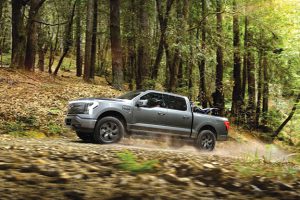Bloomberg
As the top-selling model line in the US for 40 years, Ford Motor Co’s F-Series pickups hold special weight in the auto ecosystem. The lineup, led by the F-150, generates more than $40 billion in annual revenue. Only one other US product—Apple Inc.’s iPhone—tops F-Series sales.
Given this, Ford’s decision to electrify the F-150 stands as one of the boldest strategic decisions in 21st century business. An electric F-150, more than any other vehicle, will persuade rural America to go green, leading the way for almost every automaker that finds itself challenged by the electric transition.
When now-Chief Executive Officer Jim Farley announced plans in early 2019 to sell an electric version of the F-150 — later called Lightning — he forced the hand of almost every boss in the business. Within months, several rivals—including General Motors, Stellantis, and Tesla—announced a parade of electric trucks and SUVs. “If Ford can pull this off, they’ll move the entire electric vehicle market,†says Dan Albert, automotive historian and author. “This is a cultural moment for America.â€
Regardless of how many F-150 Lightnings make it off the lot, the truck arguably already has accelerated the adoption of electric vehicles in both the supply side and the demand side.
“This vehicle is a test for adoption of electric vehicles,†Farley said when the truck was unveiled last May. “We should all watch very carefully how this does.â€
US greenhouse gas emissions in 2019 totalled 6.6 billion metric tons, with the transportation ¬sector the worst polluter. Sedans, SUVs, and pickups accounted for 1.1 billion metric tons. According to a study from the University of Michigan’s Center for Sustainable Systems commissioned by Ford, over its lifetime, a ¬battery-powered vehicle will cut emissions by 74 metric tons for a pickup, 56 metric tons for an SUV and 45 metric tons for a sedan.
US sales of new cars and light trucks in 2021 totalled 14.9m up about 3% from 2020, according to Cox Automotive. Of the total, 1.5 million were hybrid, plug-in hybrid, or electric vehicles.
Costs for Lightning owners will be considerably lower than for those owning the F-150. The $39,974 base price (factoring in federal subsidies) is 17% less than that of an entry-level F-150, according to Atlas Public Policy.
 The Gulf Time Newspaper One of the finest business newspapers in the UAE brought to you by our professional writers and editors.
The Gulf Time Newspaper One of the finest business newspapers in the UAE brought to you by our professional writers and editors.
